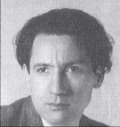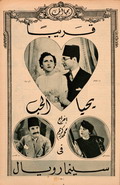Mohamed Karim
(1886-1972)

Mohamed Karim
(1886-1972)

Long Live Love (Yahyâ el houbb)

Mohamed Karim and Gaston Madri
while shooting the documentary The Zoo


Mohamed Karim
while shooting Zeinab
Mohamed Karim was born on 8 December 1886 in Abdeen in Cairo. He remembers vividly the first time he went to the cinematograph as a child, and asked his elder brother to take him there again, because he had been absolutely fascinated by it. It was this second time that “determined [his] future and led [him] along the path he took” (Ali, p. 34). Since that time “I started to imagine myself in the place of the actors I see on screen” (Ali, p. 36).
One September day in 1917 his Italian friend and neighbour told him that the Banco di Roma had established an Italian production company in Alexandria called The Italian Cinematographic Society (SITCIA). This, the first production company in Egypt, would produce films adapted from The Thousand and One Nights. Karim wrote to it, attaching 36 of his photos in several positions imitating famous actors. However, he did not succeed in his attempt for a very simple reason: he was not fluent in either Italian or French. But Karim did not give up. He immediately started learning Italian and practising it with his friends. Six months later he sent another letter to the company, this time attaching 86 new photos of himself. As a result, he received a letter from the company asking him to come to Alexandria for a screen test.
Thus it was in Alexandria that Mohamed Karim started his career.
On Saturday 20 July 1918 Karim stood in front of the camera for the first time to play the role of an officer in The Honour of the Bedouin (Charaf el Badawî). Later, he also played a small role in The Deadly Flowers (el Azhâr el Momîta). And so the man famous for being a great director started his cinema career as an actor; in fact, the first Egyptian actor in the entire history of Egyptian cinema. However no sooner had they finished the film than he realised that this was not what he desired. He decided to travel to Europe to seek the opportunity that matched his abilities and skills.
He travelled to Italy in 1920, where he played small roles in the Italian films Camello’s Revenge and Messaline. He also travelled to Germany where he took part in some German films and studied at UFA Studios. It was also there that he shifted to directing and decided to make that his career.
He returned to Egypt on 28 August 1926 and applied to Sherket Misr Lil Tamthîl we el Cinema (The Egyptian Company for Acting and Cinema) where he was asked to direct a short film about the zoo. He started the film on 15 June 1927 in which the director of photography was Hassan Mourad. Talaat Harb liked it and hired Karim in the company.
However, when he did not find a chance to fulfil his dream in directing a feature film in the company, he suggested to his childhood friend Youssef Wahbi that he direct Zeinab, his first film, starring Bahiga Hafez.
He formed a duet with Mohamed Abdel Wahab, who never acted in a film unless Karim was the director. Abdel Wahab acted in seven films all of which were directed by Karim. Karim was the first to introduce the nine year old Faten Hamama to the screen, to introduce coloured scenes in I am not an Angel (Lasto malâkn), to make a sound film, The Elite (Awlâd el dhâwat), and to be first director of the Higher Institute of Cinema in 1959.
He travelled to Italy in 1920, where he played small roles in the Italian films Camello’s Revenge and Messaline. He also travelled to Germany where he took part in some German films and studied in UFA Studios.
Article written by Mohamed Karim
Filmography:
Short Films:
1927: The Zoo (Hadîkat el hayawân)
1931: Co-operation (El Ta’awon)
1949: Meet Boulbol1949
1953: The Song of the Valley (Oghneyat nashîd el Wadî)
1954: Police Academy (Koleyat el Bolis)
1955: The Good Day (Youm el hana)
1956: All is Well (Kolloh Tamam)
Feature Films:
1930: Zeinab (silent)
1932: The Elite (Awlâd el dhawât)
1933: The White Flower (el Wardah el baydâ)
1935: The Tears of Love (Doumo’ el houbb)
1938: Long Live Love (Yahyâ el houbb)
1940: A Happy Day (Yawm sa’îd)
1942: Love is Forbidden (Mamnou’ el houbb)
1944: A Bullet in the Heart (Rasâsah fî-l-qalb)
1946: Donia (Douniâ)
1946: Their Excellencies (Ashâb el sa’âdah)
1946: I am not an Angel (Lastou malâkan)
1948: A Love that does not Die (Houbb lâ yamout)
1952: Nahed (Nâhid)
1952: Zeinab (Zeinab)
1954: The Madness of Love (Gounoun el houbb)
1956: Dalila (Dalîlah)
1959: A Heart of Gold (Qalb min dhahab)
References:
- Ali, Mahmoud. Mozakirât Mohamed Karim fi Târîkh el Cinema el Misreyah. Cairo: Akâdimeyat el Founoun, 2006.
- Bahgat, Ahmed Raafat. El Shakhseyah el ‘Arabeya fi-l- Cinema el ‘Alameyah. Cairo: el Hay̓ah el ‘Amah li-Qsour el Thaqafah.
- Daoud, Abd el Ghani. El Raheloun fe Ma̓at ‘Âm. Cairo: Wezârat el Thaqafah, 1997.
- Omar, Hassan el Imam. El Film el ‘Arabî. Cairo: Kotob lil Gamî’, February 1995, Issue 137.
- (ed.) Wassef, Magda. Egypte: 100 ans de Cinéma. Paris: Institut du Monde Arabe, 1995.

